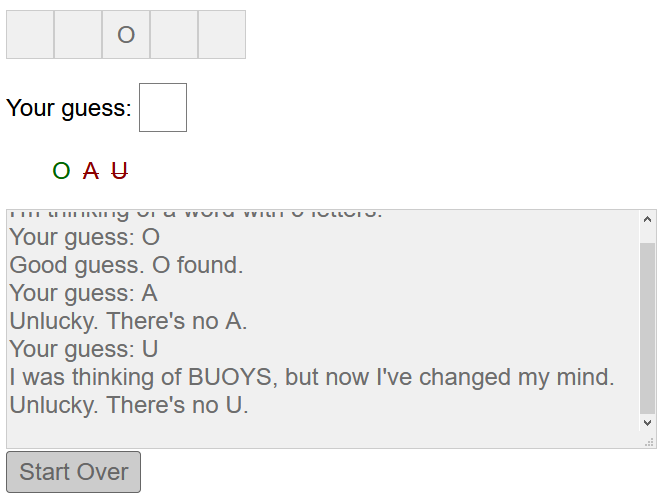Rapper’s Delight, performed by Siri, Alexa and Google Assistant
This is a repost promoting content originally published elsewhere. See more things Dan's reposted.
This is a repost promoting content originally published elsewhere. See more things Dan's reposted.
A long while ago, inspired by Nick Berry‘s analysis of optimal Hangman strategy, I worked it backwards to find the hardest words to guess when playing Hangman. This week, I showed these to my colleague Grace – who turns out to be a fan of word puzzles – and our conversation inspired me to go a little deeper. Is it possible, I thought, for me to make a Hangman game that cheats by changing the word it’s thinking of based on the guesses you make in order to make it as difficult as possible for you to win?
The principle is this: every time the player picks a letter, but before declaring whether or not it’s found in the word –

You might think that this strategy would just involve changing the target word so that you can say “nope” to the player’s current guess. That happens a lot, but it’s not always the case: sometimes, it’ll mean changing to a different word in which the guessed letter also appears. Occasionally, it can even involve changing from a word in which the guessed letter didn’t appear to one in which it does: that is, giving the player a “freebie”. This may seem counterintuitive as a strategy, but it sometimes makes sense: if saying “yeah, there’s an E at the end” increases the number of possible words that it might be compared to saying “no, there are no Es” then this is the right move for a cheating hangman.
Playing against a cheating hangman also lends itself to devising new strategies as a player, too, although I haven’t yet looked deeply into this. But logically, it seems that the optimal strategy against a cheating hangman might involve making guesses that force the hangman to bisect the search space: knowing that they’re always going to adapt towards the largest set of candidate words, a perfect player might be able to make guesses to narrow down the possibilities as fast as possible, early on, only making guesses that they actually expect to be in the word later (before their guess limit runs out!).

I also find myself wondering how easily I could adapt this into a “helpful hangman”: a game which would always change the word that you’re trying to guess in order to try to make you win. This raises the possibility of a whole new game, “suicide hangman”, in which the player is trying to get themselves killed and so is trying to pick letters that can’t possibly be in the word and the hangman is trying to pick words in which those letters can be found, except where doing so makes it obvious which letters the player must avoid next. Maybe another day.
In the meantime, you’re welcome to go play the game (and let me know what you think, below!) and, if you’re of such an inclination, read the source code. I’ve used some seriously ugly techniques to make this work, including regular expression metaprogramming (using regular expressions to write regular expressions), but the code should broadly make sense if you want to adapt it. Have fun!
Update 26 September 2019, 16:23: I’ve now added “helpful mode”, where the computer tries to cheat on your behalf rather than against you, but it’s not as helpful as you’d think because it assumes you’re playing optimally and have already memorised the dictionary!
Update 1 October 2019, 06:40: Now featured on MetaFilter; hi, MeFites!